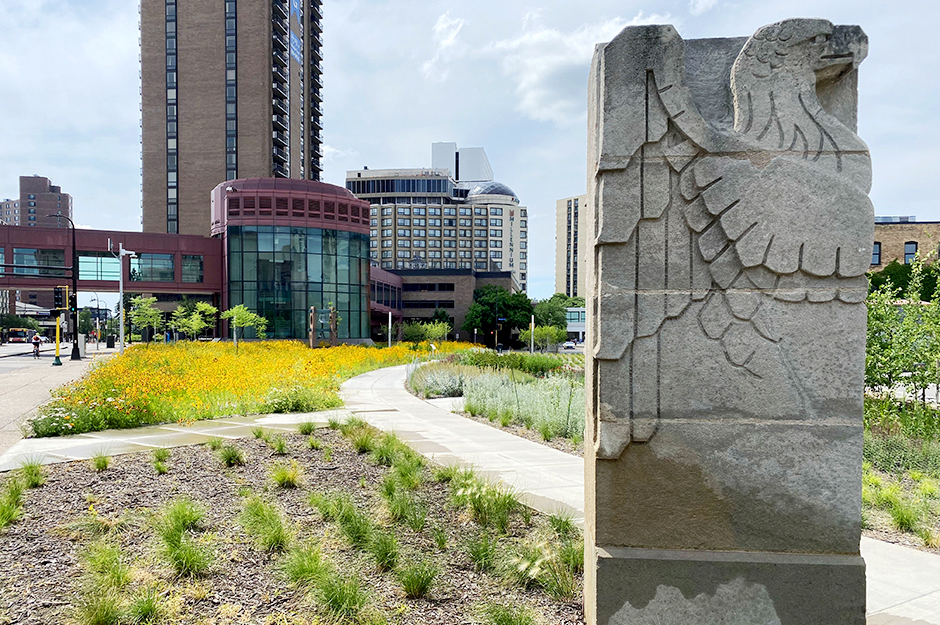What does a police contract and a convention center renovation have in common?
Well, not a lot. But in Minneapolis’ case, both became linked during Minneapolis City Council funding discussions over the last month. And the discussion is noteworthy because it demonstrated how the council’s progressive majority sometimes clashes with council veterans on process.
Here’s what happened:
The City Council passed the police contract and its funding on July 18 in a motion that originally included the passage of around $13 million in funding for the second phase of a convention center remodel.
At the time, many council members insisted both the police contract funding and the funding for the convention center needed to remain in the same act. Ultimately, the council passed the police contract funding plan in front of them that day but sent the convention center bid back to committee. This bid was later passed at the Aug. 1 council meeting.
Related | Salaries starting at $90,000 for Minneapolis police officers under new contract
So why were council members insisting the two things needed to be linked and passed on the same day?
This brings us back to the original question. What does the police contract and the convention center remodel have in common? The two things, in this case, were similar on only two counts: the timing of when they were presented to council and the fact that the majority of city council members wanted each to be funded, at least in part, by the city’s downtown assets fund. (Exciting stuff, I know. The downtown assets fund is an umbrella fund largely from local taxes that supports public assets including the convention center, Target Center and Peavey Plaza.)
When City Council Vice President Aisha Chughtai, who is also head of the council’s finance committee, presented a funding proposal for the police contract on July 18, many council members expressed confusion over why the convention center’s funding was presented in tandem.
This week, Chughtai told MinnPost the issue came down to “needs and wants” and timing. The police contract needed to be funded. Chughtai called the convention center remodel “a want.” Additionally, the $13 million funding for the convention center renovation was being presented at the same time as the police contract. “In the background of all of this we’re facing a tough budget year,” Chughtai said, noting that Minneapolis is facing a $21.6 million deficit.
Notably, the police contract funding plan Chughtai presented deviated greatly from Mayor Jacob Frey’s plan. Frey originally called for using funds already allocated for comprehensive public safety and policing alternative programs to pay for the forthcoming police raises, which many council members decried, saying this would pull from public safety initiatives like violence interrupters and various community-based groups removed from the police department.
“The mayor’s original proposed funding was gutting unarmed public safety measures to pay for the federation contract,” Chughtai said this week.
The plan Chughtai presented to council pulled from the city’s downtown asset funds and American Rescue Plan money that is set to expire to pay for the more than $9 million in future raises for police. At the July 18 meeting, the council vice president said “an entire part of this getting to this place is both of them (the police contract and convention center) being one act.”
Council Member Katie Cashman, who represents Ward 7 where the Minneapolis Convention Center is located, said she met with convention center staff and council members the morning the council was set to vote on the police contract and its funding. At the time, axing the convention center funding and funneling it into the police contract was under consideration. Cashman said she advocated that both needed to be funded and that the council could tap into the downtown asset fund.
Related | In first full year of 24/7 service, Minneapolis behavioral crisis team responds to more than 10,000 calls
As for how the two became linked together – “It was a question of whether Frey would veto the proposal, and that’s why the convention center was put into the position of being (used as) leverage,” Cashman said.
Within the next week, it was neither signed nor vetoed by Mayor Jacob Frey, which means it ultimately passed, as the mayor has only five days to veto an ordinance per the city’s charter.
Mayor Jacob Frey told MinnPost he is concerned about the council’s budget plan on two counts. He said the council has allocated public safety aid funds to things city staff say they simply cannot do. Additionally, he is concerned pulling from the downtown assets fund will ultimately lead to a need to increase city property tax levies. According to Frey, the budget passed by the council leaves about $4.5 million sitting unused in the public safety aid fund.
While Frey says council believes no public safety aid funds should go to police, he believes some of those dollars should be funneled into raises outlined in the contract. He noted that he and his administration also believe in supporting non-police public safety efforts as well. “We are 100% for that,” he said.
As the council discussed the convention center funding during its Aug. 1 meeting, some members spoke out against how the convention center project was used as leverage. At last week’s meeting Ward 13 Linea Palmisano called what happened “quid pro quo” and said the convention center project was “held hostage and used as a bargaining chip.”
“I don’t think that’s the kind of precedent we want to set as a body,” she said.
Related | Minneapolis violence prevention patrols showing promise in reducing crime
Meanwhile, at a July committee meeting, Ward 3 council member Michael Rainville expressed concerns over pulling from downtown asset funds, calling it “a slippery slope.” Rainville said he was a former convention center employee and therefore council members creating the budget should have consulted him on the proposal that lumped the center’s funding in with the police contract and pulled from the fund.
“Once you take one penny out of that (downtown assets fund) you start to destroy the hospitality industry,” Rainville claimed.
Ultimately, both the police contract funding and the convention center remodel funding were passed and passed separately and neither were vetoed by the mayor. While the police contract itself passed 8-4, five council members who supported it did not support the contract’s funding package that tapped the downtown assets fund, including Rainville, LaTrisha Vetaw, Andrea Jenkins, Emily Koski and Linea Palmisano.
There were many moments that made this end result seem unlikely, but advocates for both motions were successful in making their case. During a July 29 committee meeting, council member Jason Chavez thanked Cashman for her leadership in advocating for the convention center project. He said he was ready to not support the item but when he learned “how important it was” for Ward 7 and downtown, he changed his mind.
“I just wanted to let the public know that council member Cashman lifted a big finger on this project and if it wasn’t for her leadership, I wouldn’t be voting for this, and I think a lot of people up here wouldn’t be voting on this either,” he said.
This story has been updated to include comments from Mayor Jacob Frey and to reflect council member Rainville represents Ward 3, not 9.

Winter Keefer
Winter Keefer is MinnPost’s Metro reporter. Follow her on Twitter or email her at wkeefer@minnpost.com.





